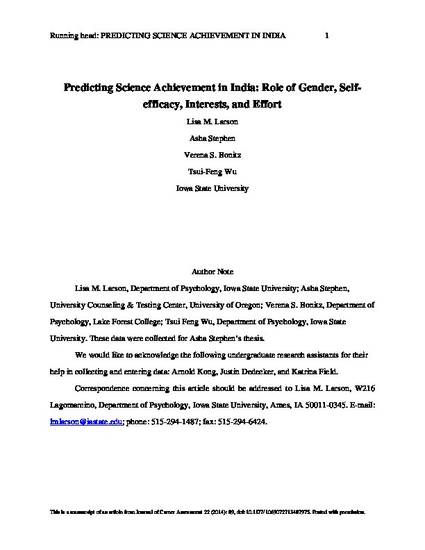
Article
Predicting Science Achievement in India: Role of Gender, Selfefficacy, Interests, and Effort
Journal of Career Assessment
Document Type
Article
Disciplines
Publication Version
Submitted Manuscript
Publication Date
1-1-2014
DOI
10.1177/1069072713487975
Abstract
We examined the role of self-reported effort in predicting chemistry and physics achievement after controlling for prior achievement, gender, and mathematics/science self-efficacy and interest. The data were collected from two Asian Indian high school samples. Self-reported effort was hypothesized to be the most salient predictor of achievement, given its important role in the Asian Indian culture. Based on prior findings, it was also hypothesized that gender would moderate the effect of interest on achievement. Both hypotheses were supported. After other key variables were controlled (prior achievement, gender, and mathematics/science self-efficacy and interest), self-reported effort was a significant predictor of both chemistry achievement and physics achievement. Moreover, gender did moderate the relation of interest and achievement. Boys who were more interested in physics and chemistry achieved higher scores, but girls’ level of interest did not correlate with their achievement.
Copyright Owner
The Authors
Copyright Date
2014
Language
en
File Format
application/pdf
Citation Information
Lisa M. Larson, Asha Stephen, Verena S. Bonitz and Tsui-Feng Wu. "Predicting Science Achievement in India: Role of Gender, Selfefficacy, Interests, and Effort" Journal of Career Assessment Vol. 22 Iss. 1 (2014) p. 89 - 101 Available at: http://works.bepress.com/lisa_larson/7/

This is a manuscript of an article from Journal of Career Assessment 22 (2014): 89, doi:10.1177/1069072713487975. Posted with permission.